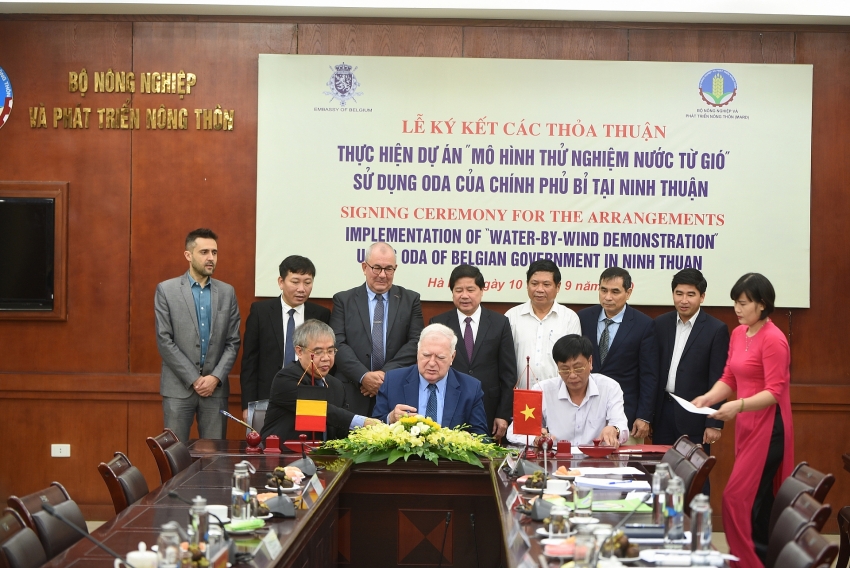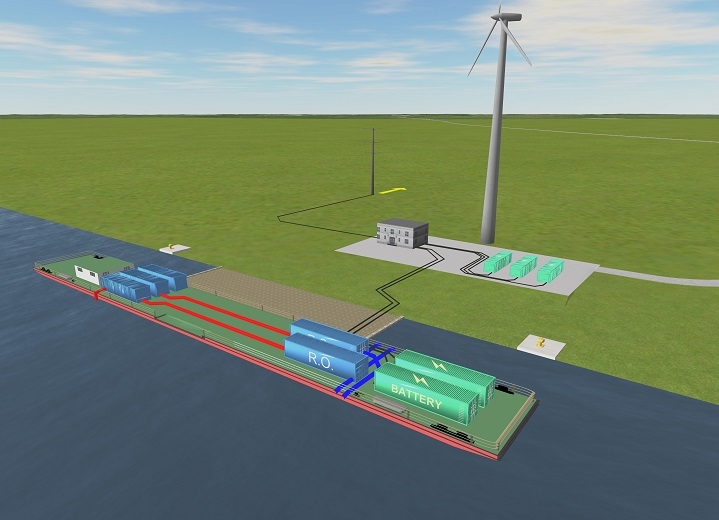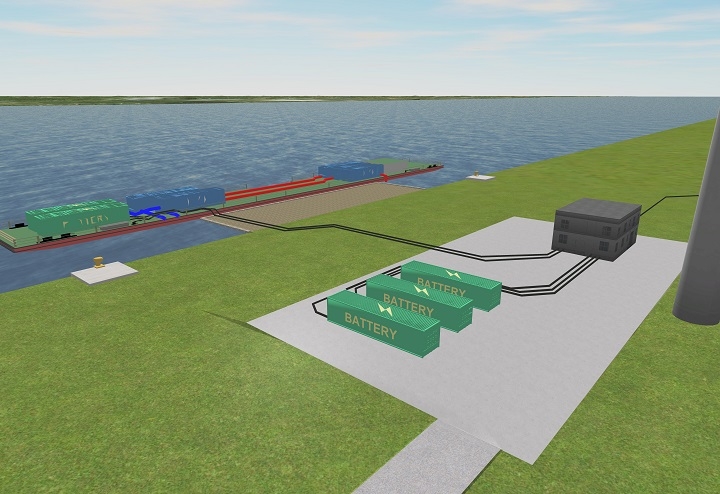Ninh Thuan to implement water-by-wind demonstration project
 |
| Ninh Thuan will receive a wind-powered water desalinisation plant financed by Belgian ODA and Smart Universal Logistics |
On September 10, the Ministry of Agriculture and Rural Development (MARD), the National Institute of Agricultural Planning and Projection, and Smart Universal Logistics (SUL) signed agreements on the implementation of the “water-by-wind demonstration” project using official development assistance (ODA) from the Belgian government in Ninh Thuan.
This demonstration wind-powered water desalinisation plant will be located at An Hai commune, Ninh Phuoc district, Ninh Thuan, following previous successes reported by a similar project in the Mekong Delta region.
Ninh Thuan has 1,000 hectares of agricultural land area, 50 per cent of which is poorer-quality sandy soil. Besides, the province lacks water for agricultural cultivation as it has been suffering severely from saltwater intrusion, making cultivation – a mainstay economic activity feeding most households in the province – even more arduous.
 |
| Ninh Thuan to implement water-by-wind demonstration project |
According to the plan, the total cost of the demonstration project will be €1.2 million ($1.42 million), of which the Belgian government pays €700,000 ($829,430) and SUL will pay €500,000 ($592,450). The demonstration project will combine with four parts, including a floating part and a section to generate, store, and supply electricity, as well as a water production system and the central control unit.
 |
The floating part will be installed on a barge with the dimensions of about 60x20x5m to house the facility. The power generation, storage, and supply section will operate with wind turbines and solar photovoltaic panels with the designed capacity of about 90kW, making the plant self-sufficient and fully sustainable.
The water production system consists of an intelligent pre-treatment unit and a reverse osmosis system with a membrane filter. The final part will be in charge of connecting and distributing electricity to the operating system.
The entire system was designed to be easy to install, maintain, and operate by local residents.
Paul Janssen, Belgian Ambassador to Vietnam said, “We need to do everything we can to mitigate the effects of climate change. At the same time, we also need to take action to adapt to the new weather patterns and to protect the future of Vietnamese agriculture. This is exactly what this water-by-wind project aims to do.”
The pilot initiative, which is jointly financed by the Belgian government, private company SUL, and the MARD, is part of the projects implemented in the framework of the Belgium-Vietnam strategic partnership in agriculture, which was signed in Brussels in October 2018 during the visit of Prime Minister Nguyen Xuan Phuc.
In the past nearly two years, this strategic partnership has been steadily gaining depth, with a growing number of initiatives.
A Belgian instrument for small- and medium-sized enterprises aiming to support the export of innovative high-tech equipment is a good example of an approach that seems perfectly suited to support the current Belgian-Vietnamese cooperation. It is a new financial instrument that offers access to innovative Belgian technologies providing solutions to challenges in Vietnam such as climate change.
In addition, the “Smart cold cabin” project in the province of Tra Vinh, also in the Mekong Delta, has been approved by the Belgian government. The project will help control the quality of fresh vegetables and fruits, especially for long-distance transportation.
“Besides, the Belgium-Vietnam academic cooperation has invested a lot and keeps investing in the sustainability of Vietnamese aquaculture together with ongoing Can Tho University research projects to adapt aquaculture to water with higher saline content. With the water-by-wind project, we aim to help rice farmers and facilities access freshwater,” Janssen said.
What the stars mean:
★ Poor ★ ★ Promising ★★★ Good ★★★★ Very good ★★★★★ Exceptional
Related Contents
Latest News
More News
- VinaCapital launches Vietnam's first two strategic-beta ETFs (February 26, 2026 | 09:00)
- PM sets five key tasks to accelerate sci-tech development (February 26, 2026 | 08:00)
- PM outlines new tasks for healthcare sector (February 25, 2026 | 16:00)
- Citi report finds global trade transformed by tariffs and AI (February 25, 2026 | 10:49)
- Vietnam sets ambitious dairy growth targets (February 24, 2026 | 18:00)
- Vietnam, New Zealand seek level-up in ties (February 19, 2026 | 18:06)
- Untapped potential in relations with Indonesia (February 19, 2026 | 17:56)
- German strengths match Vietnamese aspirations (February 19, 2026 | 17:40)
- Vietnam’s pivotal year for advancing sustainability (February 19, 2026 | 08:44)
- Strengthening the core role of industry and trade (February 19, 2026 | 08:35)

 Tag:
Tag:


























 Mobile Version
Mobile Version